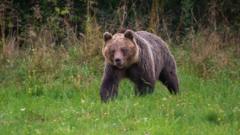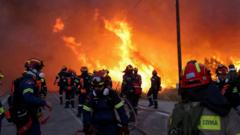Amid growing concerns over human safety and a series of bear attacks, Slovakia plans to shoot 350 out of approximately 1,300 brown bears. The decision has drawn sharp criticism from conservationists who argue it contravenes legal protections and fails to address the root causes of bear encounters.
Slovakia Moves to Cull 350 Bears Amid Rising Human-Bear Conflicts

Slovakia Moves to Cull 350 Bears Amid Rising Human-Bear Conflicts
Following a tragic incident where a man was killed by a bear, Slovakia's government has approved a controversial plan to cull a significant portion of its brown bear population.
Slovak authorities have declared a state of emergency, extending a shooting plan that permits the culling of 350 brown bears, equivalent to about a quarter of the nation's estimated population. This decision follows a tragic incident in which a man was mauled to death in Central Slovakia, reigniting debates on human-wildlife conflict and the safety of individuals venturing into forested areas.
Prime Minister Robert Fico's government expressed that the safety of citizens is paramount, noting, "We can't live in a country where people are afraid to go into the woods." With the state of emergency now covering 55 of the nation's 79 districts, the Slovak government has already taken steps to ease protections for bears, allowing for their culling if they encroach on human settlements.
While the government states the need to protect residents, conservationists are vocally opposed to the culling strategy, claiming it undermines Slovakia's international commitments concerning wildlife protection. Michal Wiezek, an ecologist and member of the European Parliament for the opposition, labeled the move as "absurd," emphasizing that the government has failed to address the issue effectively by opting for more killings rather than preventative measures.
Amidst this backdrop, Slovak police have confirmed the fatal attack of the 59-year-old man, discovered with severe injuries and near a bear den, bringing into sharp focus the hazards posed by expanding bear populations. This growing concern for human safety comes on the heels of several notable incidents, including a series of confrontations which led to both fatalities and heightened public fear.
Environmental Minister Tomas Taraba notes the current bear population of over 1,300 has prompted discussions on necessary culling to maintain a balanced ecosystem, although experts argue that numbers remain stable. As bears traverse the Carpathian mountain range spanning several countries, the complexities surrounding human interactions and wildlife management continue to evoke strong reactions and calls for comprehensive solutions that prioritize safety while respecting animal rights.






















